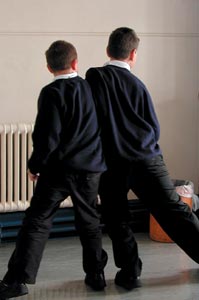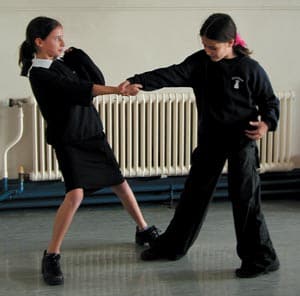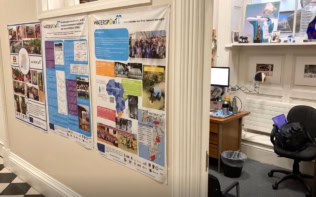Is it best to aim school physics teaching at a talented minority of specialists? Or should it be made more accessible so that people can appreciate the role of physics in society? Opening this special section on education, Mark Ellse argues that physics is an elite activity that only a few will ever appreciate, while Jonathan Osborne believes that we should communicate the excitement of physics to all

Mark Ellse: Some years ago I was a member of a panel interviewing people who wanted to set GCSE science examinations. These exams, which consist of physics, chemistry and biology sections, are taken by most 16 year olds in the UK, except Scotland. Although biologists and chemists were applying for the posts, there were no physics applicants. I sensed a struggle emerging as other members of the appointments panel were convinced that Dr X (as I will refer to him) was as capable as he claimed of setting a few physics questions.
“Dr X,” I asked, “could you explain to us what force it is that accelerates a bicycle forwards?”
“It’s the force of the rider on the pedals,” he replied.
“And which way does that force act?”
“Downwards.”
“So Dr X, could you explain to us why this downwards force causes the cycle to accelerate forwards?”
There was an apology, a long pause, and then a flash of insight. “It’s the force of friction!” he insisted.
“But Dr X,” I persevered, “which way does friction act?” In a few more sentences, Dr X had completely tied himself in knots. He knew that “friction opposes the motion”, but was at a loss as to why a force that he reasoned was backwards could accelerate the bicycle forwards. The other panel members were slow, but not that slow. On this occasion I managed to persuade my colleagues that it was essential to appoint a physicist to set the physics questions. Sadly, however, this has not always been the case. The physics parts of many science courses are routinely marked by people with little or no understanding of physics, which has led to a steady deterioration in the standards of school physics.
The word “elitist” has such a pejorative ring that we often forget that it refers to the importance of a small, well educated minority. And in their own field, physicists are an elite. Physics is a subject that requires certain intellectual skills that the majority of the population do not have. This argument is, however, terribly unfashionable at present. Although few people would accept that everyone should study integral calculus, carry out brain surgery, or even install a gas fire, there persists a strange notion that anyone and everyone can study and – I shudder when I think of it – even teach physics. Such a notion is patently absurd. Real physics will, by its very nature, be the province of an elite minority.
Jonathan Osborne: Many years ago, out of pure interest, I took an MSc in astrophysics. One of the courses in stellar nucleosynthesis of the elements taught me the following – aptly summarized by Marcus Chown in New Scientist (7 November 1998 p62).
“But if all these examples of our cosmic connectedness fail to impress you, hold up your hand, ” he wrote. “You are looking at stardust made flesh. The iron in your blood, the calcium in your bones, the oxygen that fills your lungs each time you take a breath – all were baked in the fiery ovens deep within stars and blown into space when those stars grew old and perished. Every one of us was, quite literally, made in heaven.”
While I agree that most of the knowledge that I gained on that course was not accessible to the overwhelming majority of the population, this idea – one of the many amazing and wondrous “tales” that science has to tell – is comprehensible by most, if not all. Hence I would argue that there are several fundamental problems with reserving all physics and science education for what Mark Ellse calls an “elite”. The elite is, in fact, a dwindling group of individuals (overwhelmingly male) who have the tenacity to persist with physics in spite of, rather than because of, the education they have received. Too much of physics education is a training not an education.
Your view, Mark, would deny all knowledge of the best explanations of the material world that physics offers – from simple explanations of a rainbow to how the universe began – to all. Nobody would ever dream of arguing that the study of English literature should be reserved simply for those who have the capability to understand the finer nuances of Chaucer or Anglo-Saxon English. Instead, English teachers try to give pupils – by selective study of a few appropriate books – a love of language and some understanding of the cultural achievements of great writers. Why can we not do the same for physics?
Mark Ellse: Ah yes, the wonder of physics! But, Jonathan, I hope you won’t mind if I pick holes in the fashionable notions that you present. Let’s start with the things with which we would both agree. We want everyone to appreciate the beauty of the physical world – education for its own sake as part of our culture and for the public support of science. And we want an adequate supply of scientists both for utilitarian reasons and to continue this important facet of our culture.
But if we examine the current physics education offered with these criteria in mind, we realize that it fails resoundingly. Public esteem of science is at an all-time low, and the number of people studying physics at, for instance, A-level continues to fall, despite there being more 18 year olds taking A-levels than ever before. Much of this is the fault of the present National Curriculum for science, based as it is on the idea that everyone has a right to science education and that everyone should receive the same tuition. In practice, this means that all pupils are subjected to an equally confused education in physics.
In a sense, physics began with Descartes and the notion of inertia – that blinding flash of insight that the natural state of motion is a constant velocity. Such a thought must have been a wonderful surprise to him. He had stumbled on the answer to a mystery – a secret revealed. It occurred to a mature adult, who had been brought up to think that a body’s natural state of motion is either circular or deceleration in a straight line. Imagine how thrilled he was when the new idea occurred to him – running in excitement to share his understanding with others.
We can all remember our excitement when we have unravelled mysteries, when the secrets of the universe have been revealed. But now these are thrust at children of an age and ability who simply cannot understand their value. According to the National Curriculum, five and six year olds are supposed to “be taught to recognize that when things speed up, slow down or change direction, there is a cause, for example a push or a pull”. So before children have ordered their own observations of the world, our curriculum attempts to thrust upon them a sophisticated model that only an elite few will ever appreciate.
Such an attempt is absurd. By being told by their teachers that “a force is a thing that keeps things going”, most primary-school children are only learning that science is confusing. Only the brightest children realize that it is their teachers who are the most confused. We are failing to recognize that most physics is only accessible to a tiny minority of the population. We debase the currency by sprinkling it at random throughout our schools.
Jonathan Osborne: How many times, Mark, have you had to deal with that dreaded social question: “So what do you do?” It is dreaded because when you reveal that you are a physicist or physics teacher, you can sense a deep feeling of inner panic as your questioners dredge their long and hastily forgotten memories for anything apt to say. The more literary among them will jokingly recall Sylvia Plath’s recollections in her novel The Bell Jar that “the day I went into the physics class it was death” – before you relieve them of their misery and tactfully change the conversation.
This outcome is a product of the kind of physics education that you advocate. I am therefore pleased that you do not wish to deliver it to everyone, in the process sparing future generations from such experiences. But the fundamental issue for me is embodied in Thomas Jefferson’s comment that “those who are ignorant and free never have been and never will”. The kind of physics education that you advocate has kept most people ignorant of the powerful vision of the material world that physics offers.
In contrast, I believe in a vision of physics education that can communicate to the majority some of the excitement of physics – whether it be the causes of a rainbow or simple pictures of our understanding of matter. Young people have a right to be offered such powerful knowledge. Just as important as what we know – the overwhelming focus of the National Curriculum – is how we know what we know. Ask any group of science teachers how we know that day and night are caused by a spinning Earth and you will immediately expose the inadequacies of the evidential basis of their own beliefs; I rarely find that more than 10% can give me one of the two crucial pieces of evidence.
As for the decline in uptake in physics, I fear that you are confusing cause and effect, and ascribing causality where there is correlation. Yes, a National Curriculum has been introduced; yes, the public attitude is much more circumspect about science (and rightly so); and yes, there has been an ongoing decline in the number of individuals taking A-level physics. But there is no evidence to show that these are causally related.
Research suggests that, after gender, the most significant determinant of attitude to school physics is the quality of teaching that a student experiences. The answer to your problem lies both in the quality and the quantity of physics teachers we can recruit. Given the consumer-driven student-led approach to subject choice post-16, which is a result of the increasing plethora of A-levels on offer, it is hardly surprising that many students walk away from what they perceive to be “hard” subjects, such as physics.
Mark Ellse: Wouldn’t it be lovely if we could all live in a cosy world where we all learned physics from our mother’s knee, thrived on scientific diet, and grew up to be knowledgeable and therefore free? It is a view of utopia, and just as unrealistic. It ignores the very real problems that stand in the way, as well as the very real and practical constraints caused by the fact that physics is hard.
I recall a lesson that I observed during a recent school inspection, in which a class of 15 and 16 year olds was watching a video about polar bears. They were learning that polar bears are large and fat, with white fur for camouflage and warmth. The teaching seemed well adapted to the pupils. Only a more careful quizzing of the pupils, however, revealed what was going on in their minds.
At one level, the pupils were learning what amounts to little more than primary-school science: an eight year old, after all, could quite easily understand why polar bears are fat, white and furry. But this is not physics, and it never will be. If you asked the pupils about the role played by the surface area of the bears, most pupils would get completely tangled up because they cannot see the link between surface area and the need to keep warm. Only the potential physicists among the pupils would understand the concept of surface area to volume ratio.
Most school physics lessons are currently like this, combining primary-school “nature study” with real physics. In the laughable aim of “physics for all”, the quantity of real physics has dropped so far that what purports to be “school physics” is not attractive to those who are potential physicists. And, as ever, those who never did understand it, never will. Like brain surgery and number theory, physics will forever be an elite activity, and I am not ashamed to belong to that elite.
Jonathan Osborne: Mark, physics education has three seemingly contradictory aims, which is why it gets into the difficulties you describe. First, physics education wants to offer us the means to discover our own knowledge – this is the real excitement of physics and you can see it in the fascination of primary-school children and, sometimes, in PhD students. Sadly, the period between seems to be somewhat bereft of such experiences.
Second, physics education attempts to prepare the next generation of students who wish to become scientists – essentially what I think you feel should be its main role. The problem is that this aim has little to do with education and everything to do with a pre-professional form of training. In this phase, the student has to acquire a body of unequivocal and unquestioned knowledge that requires a hard and disciplined struggle. The reality is that only a fixed percentage of the population have the stomach for this – your elite. And, if this is what you want, then I would agree – we should only teach physics to those who want to learn as there is no justification for teaching it to all.
Finally, science education is increasingly expected to educate all young people about physics and science so that they will have a background of knowledge that will enable them to cope with the political and moral dilemmas posed by new scientific developments. After all, democracies function by majority decisions on topics that require more and more background knowledge.
Most of what the public needs to know not only requires some technical knowledge of science, but also an understanding of how scientific knowledge is achieved, how it is validated and what the associated risks are. Just look at the absurd actions of many parents who refuse to allow their children to be given a single vaccine against measles, mumps and rubella (MMR) – preferring that the vaccinations should instead be given separately. In the process, these parents are putting their children at the increased risk of infection from measles or rubella.
A science and physics education that addressed such a body of knowledge would, as you know, be a different beast, and is essentially what is currently being articulated in the new course 21st Century Science. I would argue that it is this kind of knowledge that everybody needs, including your elite who will still get their specialized training, as most scientists are only expert in one very small domain, and an increasingly small one at that.
Ultimately, however, I must ask how the form of physics education you advocate would defend itself against the view of Matthew Arnold – the great 19th-century head of Rugby School. He believed that offering a scientific training as a form of education would produce a “useful specialist” – but not a truly educated man. A century and a half later, I hope that we could agree to move on.




